Reading South Africa - An analysis of a recent survey that was conducted in September 2013
The Reason why I conducted a survey
The Beeld newspaper of South Africa had some shocking statistics on the 2nd of September. In an article called 'A nation that doesn't read' it stated that a mere 14% of South Africans actually read books where only 1% of the nation is prepared to pay for a book. Sure, not every citizen of the country is a book worm, but why are bookshops not scarce and bringing in revenue. Why do people crowd like bees around book sales in malls if they don’t read? Karin Burger of the Rapport newspaper responded with another article a few days later called 'Only 14% read? That's old news!" This time the statistics seemed a little more promising, but I wasn't convinced. Reaching the entire country with one survey, was an impossible task for a bloke sitting somewhere in Dubai and therefore I tried to target the Afrikaans and English markets only. Not only did I want to prove the Beeld statistics wrong, but I was also interested in one major element: Do people who come from families that read, tend to read more than those who don’t come from families that read? Does it even matter? I also wanted to know if those who read books, stick with writers they are familiar with and/or whether they give new writers a fair chance as well?
The hypothesis
I believe that at least 50 percent of the South African population read. I also believe that when parents set an example to their kids, their children will most probably become readers themselves. I also feel that more Afrikaans speaking South Africans still prefer English books than their mother tongue. I assume more Afrikaans people will do the survey, because of mutual friends. I'm taking a guess, but I think the three favourite Afrikaans writers will be Deon Meyer, Andre P. Brink and Maritha van der Vyfer. In English I'm going to go for John Grisham, Jodie Picoult and Wilbur Smith.
Factors that may have influenced the survey
I asked people I knew on Facebook to forward the survey to people they knew. The idiom is true: Birds of a feather, flock together and because I’m involved with reading and writing, so are my friends and their friends and I believe that we did not target the whole spectrum of readers and non-readers.I also gathered that people who don’t mind reading, also don’t mind doing surveys. It makes sense: "If I don’t even read a short story, why am I going to do a silly survey?"I didn't just advertise the survey on book related groups. I asked people from all walks of life and even targeted expat South Africans living abroad to find out about their reading habits.
The Questions
The questions were as follow:
How many books do you read on Average per year?What is your mother tongue?What language do you prefer to read in?Rate which genre you prefer.Name 3 of your favourite Afrikaans writers.Name 3 of your favourite English writers.Do you come from a family that reads?
The answers
More than 300 individuals participated in the survey and I'm sharing the following statistics with you.
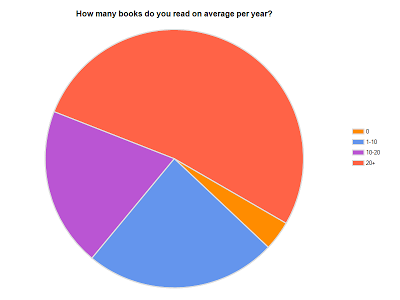 52% of people said that they read more than 20 books a year. I find the blue and purple very interesting. 20% (purple) mentioned that they read 10 - 20 books a year, while 24% said only 1 - 10 books. Almost 4% said they don't read any books whatsoever. This means almost a third of participants read less than 10 books a year.
52% of people said that they read more than 20 books a year. I find the blue and purple very interesting. 20% (purple) mentioned that they read 10 - 20 books a year, while 24% said only 1 - 10 books. Almost 4% said they don't read any books whatsoever. This means almost a third of participants read less than 10 books a year.
On to the next graph.
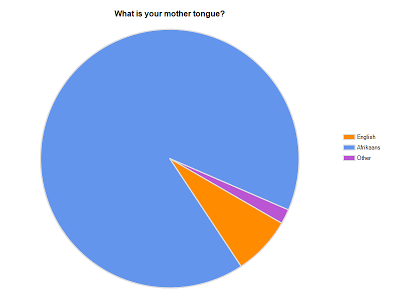
I wasn't surprised that the survey was answered by 91% of Afrikaans speakers. As I said in my hypothesis, friends who send the survey to friends have more Afrikaans friends than English speaking friends. This does mean that we'll get a better impression then on the reading habits of Afrikaans citizens.
Preferred language to read in
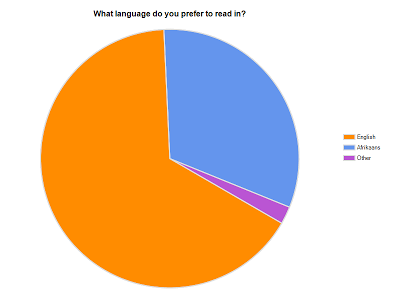
Also not the biggest surprise. 66% of participants preferred reading in English. Is this because there are more genres and choices out there or because they just dislike Afrikaans literature in general?
While cross referencing the data, I found that 5.3% of the English participants say that don't read a single book per year, compared to 3.7% of Afrikaans speaking participants. Could we then suggest that Afrikaans people in general are more frequent readers? I would want to rather have a fair amount of both languages answering, before I would make such a statement.
What do you read?
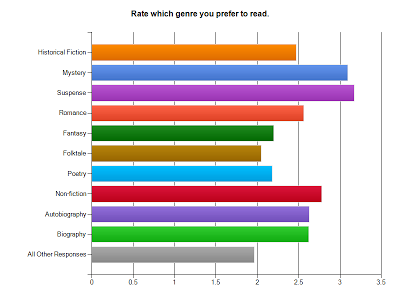 I was almost sure that mystery and suspense would be front runners in this category, but I have to say that I didn't expect non-fiction in the 3rd place. Then again biographies and autobiographies beat romance, which was also another surprise. Why don't publishers not just focus more on some good autobiographies then? It's something to consider.
I was almost sure that mystery and suspense would be front runners in this category, but I have to say that I didn't expect non-fiction in the 3rd place. Then again biographies and autobiographies beat romance, which was also another surprise. Why don't publishers not just focus more on some good autobiographies then? It's something to consider.
Historical fiction didn't do too poorly either and it seems there is still a definite place for it in the market. I was however surprised by poetry. It might not be there with the top runners, but there is still a market. Readers still read it.
Favourite Afrikaans authors
I have to say that I was most surprised with this category in particular. Not so much about the favourites, but of the variety I saw. Deon Meyer was a clear favourite which was no surprise at all. But close on his heels came Maritha van der Vyfer, Andre P. Brink, Dalene Matthee and Etienne van Heerden. The fans also love Annelie Botes and Chanette Paul with PG du Plessis and Karin Brynard right on their tails. I expected to see these names and they all deserve to be there.
The surprise however was the amount of other authors who readers chose as their favourite Afrikaans authors of all time. Some got more votes than others, but in general these shone through: Maretha Maartens, Solly Osrovech, F.A Venter, Riana Scheepers, Pat Stamatelos, Leon van Nierop, Deon Opperman, Herman Charles Bosman, Ena Murry, Elize Parker, Bernette Bergenthuin, Elsa Joubert, Breyten Breytenbach, Antjie Krog, Marlene van Niekerk, Irma Joubert, Irma Venter, Margaret Bakkes, Alexander Strachan, Marion Erskine, Helene de Kock, Pieter Pieeterse, Wilna Adriaanse, Marzanne leroux-van der boon, Dana Snyman, Toast Coetzer, Koos Kombuis, Marlene van Niekerk, Steve Hofmeyr, Jeanne Goosen,, Isa Konrad, Sophia Kapp, Braam de Vries, Anchen Troskie, Jaco Jacobs, Abraham H. de Vries, Stella Blakemore, Daniel Hugo, Elenor Baker, Marlize Hobbs, Reza de Wet, Nicola Hanekom, Carina Diedericks-Hugo, Dolf van Niekerk, Ingrid Winterbach, Susan Coetzer, Eben Venter, Francois Bloemhof, Leon Roussouw, Gustav Venter, Chris Barnard, Adrio Konig, Karl Kielblock, Gerrie Radlof, Hennie Aucamp, Ettie Bierman, Rachelle Greeff, Rika du Plessis, Mari van den Berg, Deon Malherbe, Alta Cloete, Annelie Barkhuizen Le Roux, Elsa Winckler, Kristel Loots, Etienne Leroux, CJ Langehoven, Christa Jonker-Jordaan, Chris Karsten, Audrey Blignaut, Dirk Jordaan. Elizabeth Eybers, Anoeshka von Meck, Marzane le Roux, Dan Sleigh, Karel Schoeman, Marietjie de Jongh, J.M. Gilfillan, Helena Hugo, Max du Preez, Dot Serfontein, Hettie Britz, Carla van der Spuy, Margie Orford, Fanie Olivier, Fanie Viljoen, Jan F E Celliers, N P Van Wyk Louw, Abraham Nel, Riana Mouton, C Johan Bakkes, Christene Neser, Topsy Smith, Lizette Murray, Jaco Fouché, Anna Pentzhorn, Henning Pieterse, Amos van der Merwe, Nathaniël, Engela van Rooyen, Petra Muller, Wilma Stockenstrom, Willie Martens, Tryna du Toit, Madelie Human. (I apologise for not checking every name and spelling and also their books)
And English?
The list of favourite English authors was just as extensive. Grisham, Picoult and Wilber Smith were definitely favourites, but Terry Pratchet, Dan Brown, Francine Rivers, Khaled Hosseini, James Patterson, Paulo Coelho, J.K. Rowling, Tolkien, Danielle Steele, Koontz and Karen Kingsbury were high up there with the others. Although a few new authors were mentioned, it seemed that established writers definitely got the most love from loyal fans.
Monkey see, monkey do?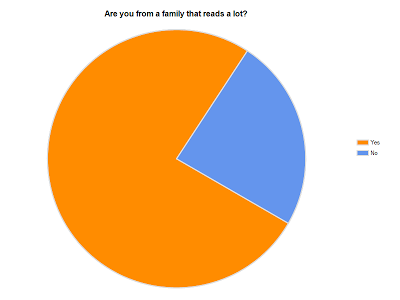
A whopping 76% of participants answered "Yes" to this question. It is a clear indication that when children see their parents with a book, they might do the same.
I also did some cross referencing and also found out that 56% of people who said they don't read a single book, came from families that don't read. An interesting statistic to say the least. But look at this: 83.1% of people who read more than 20 books a year, said they come from a family that reads a lot.
It all boils down to this...
As I said before, I wanted to prove two things.That the Beeld article had outdated and unreliable data, andThat families who love reading have a definite impact on their children.
From the data gathered, I could prove both.
Although 300 people aren't nearly enough to rely upon, I tend to agree more with these statistics as I feel they're more spot on. I'd love for book lovers to conduct a similar survey in the other major languages, too. Still, I think it is impossible that only 14% of the country read.
I think publishers should ask themselves if they could learn anything from this. They're on the right track with suspense novels, but who knew that biographies are current favourites? They should also establish why Afrikaans people still prefer to read English books. Are they better, or are the genres and options just more in English?
What I found most interesting about the favourite authors, is that many new Afrikaans voices are being heard. In contrast to this, very few new English authors are heard. What can we do to get the word out and help them earning fans and a fair chance?
I want to personally thank each and everyone who participated in this survey. Please be examples to your family members. You now see proof that kids need a reading environment to ensure that they will become passionate readers. Never stop reading.
“We read to know that we are not alone.”
― William Nicholson
Marion.
The Beeld newspaper of South Africa had some shocking statistics on the 2nd of September. In an article called 'A nation that doesn't read' it stated that a mere 14% of South Africans actually read books where only 1% of the nation is prepared to pay for a book. Sure, not every citizen of the country is a book worm, but why are bookshops not scarce and bringing in revenue. Why do people crowd like bees around book sales in malls if they don’t read? Karin Burger of the Rapport newspaper responded with another article a few days later called 'Only 14% read? That's old news!" This time the statistics seemed a little more promising, but I wasn't convinced. Reaching the entire country with one survey, was an impossible task for a bloke sitting somewhere in Dubai and therefore I tried to target the Afrikaans and English markets only. Not only did I want to prove the Beeld statistics wrong, but I was also interested in one major element: Do people who come from families that read, tend to read more than those who don’t come from families that read? Does it even matter? I also wanted to know if those who read books, stick with writers they are familiar with and/or whether they give new writers a fair chance as well?
The hypothesis
I believe that at least 50 percent of the South African population read. I also believe that when parents set an example to their kids, their children will most probably become readers themselves. I also feel that more Afrikaans speaking South Africans still prefer English books than their mother tongue. I assume more Afrikaans people will do the survey, because of mutual friends. I'm taking a guess, but I think the three favourite Afrikaans writers will be Deon Meyer, Andre P. Brink and Maritha van der Vyfer. In English I'm going to go for John Grisham, Jodie Picoult and Wilbur Smith.
Factors that may have influenced the survey
I asked people I knew on Facebook to forward the survey to people they knew. The idiom is true: Birds of a feather, flock together and because I’m involved with reading and writing, so are my friends and their friends and I believe that we did not target the whole spectrum of readers and non-readers.I also gathered that people who don’t mind reading, also don’t mind doing surveys. It makes sense: "If I don’t even read a short story, why am I going to do a silly survey?"I didn't just advertise the survey on book related groups. I asked people from all walks of life and even targeted expat South Africans living abroad to find out about their reading habits.
The Questions
The questions were as follow:
How many books do you read on Average per year?What is your mother tongue?What language do you prefer to read in?Rate which genre you prefer.Name 3 of your favourite Afrikaans writers.Name 3 of your favourite English writers.Do you come from a family that reads?
The answers
More than 300 individuals participated in the survey and I'm sharing the following statistics with you.
 52% of people said that they read more than 20 books a year. I find the blue and purple very interesting. 20% (purple) mentioned that they read 10 - 20 books a year, while 24% said only 1 - 10 books. Almost 4% said they don't read any books whatsoever. This means almost a third of participants read less than 10 books a year.
52% of people said that they read more than 20 books a year. I find the blue and purple very interesting. 20% (purple) mentioned that they read 10 - 20 books a year, while 24% said only 1 - 10 books. Almost 4% said they don't read any books whatsoever. This means almost a third of participants read less than 10 books a year.On to the next graph.

I wasn't surprised that the survey was answered by 91% of Afrikaans speakers. As I said in my hypothesis, friends who send the survey to friends have more Afrikaans friends than English speaking friends. This does mean that we'll get a better impression then on the reading habits of Afrikaans citizens.
Preferred language to read in

Also not the biggest surprise. 66% of participants preferred reading in English. Is this because there are more genres and choices out there or because they just dislike Afrikaans literature in general?
While cross referencing the data, I found that 5.3% of the English participants say that don't read a single book per year, compared to 3.7% of Afrikaans speaking participants. Could we then suggest that Afrikaans people in general are more frequent readers? I would want to rather have a fair amount of both languages answering, before I would make such a statement.
What do you read?
 I was almost sure that mystery and suspense would be front runners in this category, but I have to say that I didn't expect non-fiction in the 3rd place. Then again biographies and autobiographies beat romance, which was also another surprise. Why don't publishers not just focus more on some good autobiographies then? It's something to consider.
I was almost sure that mystery and suspense would be front runners in this category, but I have to say that I didn't expect non-fiction in the 3rd place. Then again biographies and autobiographies beat romance, which was also another surprise. Why don't publishers not just focus more on some good autobiographies then? It's something to consider.Historical fiction didn't do too poorly either and it seems there is still a definite place for it in the market. I was however surprised by poetry. It might not be there with the top runners, but there is still a market. Readers still read it.
Favourite Afrikaans authors
I have to say that I was most surprised with this category in particular. Not so much about the favourites, but of the variety I saw. Deon Meyer was a clear favourite which was no surprise at all. But close on his heels came Maritha van der Vyfer, Andre P. Brink, Dalene Matthee and Etienne van Heerden. The fans also love Annelie Botes and Chanette Paul with PG du Plessis and Karin Brynard right on their tails. I expected to see these names and they all deserve to be there.
The surprise however was the amount of other authors who readers chose as their favourite Afrikaans authors of all time. Some got more votes than others, but in general these shone through: Maretha Maartens, Solly Osrovech, F.A Venter, Riana Scheepers, Pat Stamatelos, Leon van Nierop, Deon Opperman, Herman Charles Bosman, Ena Murry, Elize Parker, Bernette Bergenthuin, Elsa Joubert, Breyten Breytenbach, Antjie Krog, Marlene van Niekerk, Irma Joubert, Irma Venter, Margaret Bakkes, Alexander Strachan, Marion Erskine, Helene de Kock, Pieter Pieeterse, Wilna Adriaanse, Marzanne leroux-van der boon, Dana Snyman, Toast Coetzer, Koos Kombuis, Marlene van Niekerk, Steve Hofmeyr, Jeanne Goosen,, Isa Konrad, Sophia Kapp, Braam de Vries, Anchen Troskie, Jaco Jacobs, Abraham H. de Vries, Stella Blakemore, Daniel Hugo, Elenor Baker, Marlize Hobbs, Reza de Wet, Nicola Hanekom, Carina Diedericks-Hugo, Dolf van Niekerk, Ingrid Winterbach, Susan Coetzer, Eben Venter, Francois Bloemhof, Leon Roussouw, Gustav Venter, Chris Barnard, Adrio Konig, Karl Kielblock, Gerrie Radlof, Hennie Aucamp, Ettie Bierman, Rachelle Greeff, Rika du Plessis, Mari van den Berg, Deon Malherbe, Alta Cloete, Annelie Barkhuizen Le Roux, Elsa Winckler, Kristel Loots, Etienne Leroux, CJ Langehoven, Christa Jonker-Jordaan, Chris Karsten, Audrey Blignaut, Dirk Jordaan. Elizabeth Eybers, Anoeshka von Meck, Marzane le Roux, Dan Sleigh, Karel Schoeman, Marietjie de Jongh, J.M. Gilfillan, Helena Hugo, Max du Preez, Dot Serfontein, Hettie Britz, Carla van der Spuy, Margie Orford, Fanie Olivier, Fanie Viljoen, Jan F E Celliers, N P Van Wyk Louw, Abraham Nel, Riana Mouton, C Johan Bakkes, Christene Neser, Topsy Smith, Lizette Murray, Jaco Fouché, Anna Pentzhorn, Henning Pieterse, Amos van der Merwe, Nathaniël, Engela van Rooyen, Petra Muller, Wilma Stockenstrom, Willie Martens, Tryna du Toit, Madelie Human. (I apologise for not checking every name and spelling and also their books)
And English?
The list of favourite English authors was just as extensive. Grisham, Picoult and Wilber Smith were definitely favourites, but Terry Pratchet, Dan Brown, Francine Rivers, Khaled Hosseini, James Patterson, Paulo Coelho, J.K. Rowling, Tolkien, Danielle Steele, Koontz and Karen Kingsbury were high up there with the others. Although a few new authors were mentioned, it seemed that established writers definitely got the most love from loyal fans.
Monkey see, monkey do?

A whopping 76% of participants answered "Yes" to this question. It is a clear indication that when children see their parents with a book, they might do the same.
I also did some cross referencing and also found out that 56% of people who said they don't read a single book, came from families that don't read. An interesting statistic to say the least. But look at this: 83.1% of people who read more than 20 books a year, said they come from a family that reads a lot.
It all boils down to this...
As I said before, I wanted to prove two things.That the Beeld article had outdated and unreliable data, andThat families who love reading have a definite impact on their children.
From the data gathered, I could prove both.
Although 300 people aren't nearly enough to rely upon, I tend to agree more with these statistics as I feel they're more spot on. I'd love for book lovers to conduct a similar survey in the other major languages, too. Still, I think it is impossible that only 14% of the country read.
I think publishers should ask themselves if they could learn anything from this. They're on the right track with suspense novels, but who knew that biographies are current favourites? They should also establish why Afrikaans people still prefer to read English books. Are they better, or are the genres and options just more in English?
What I found most interesting about the favourite authors, is that many new Afrikaans voices are being heard. In contrast to this, very few new English authors are heard. What can we do to get the word out and help them earning fans and a fair chance?
I want to personally thank each and everyone who participated in this survey. Please be examples to your family members. You now see proof that kids need a reading environment to ensure that they will become passionate readers. Never stop reading.
“We read to know that we are not alone.”
― William Nicholson
Marion.
Published on September 19, 2013 11:31
No comments have been added yet.



